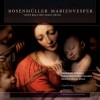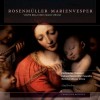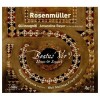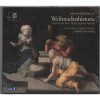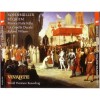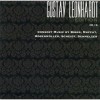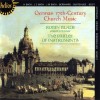Composers
Johann Rosenmüller (1619 – September 10, 1684), was a German Baroque composer, who played a part in transmitting Italian musical styles to the north.
Rosenmüller was born in Oelsnitz, near Plauen, Germany.[1] He studied at the University of Leipzig, graduating in 1640.[2] He served as organist of the Nikolaikirche Leipzig from 1651, and had been assured of advancement to cantor.[1] He became director of music in absentia to the Altenburg court in 1654.[1] However, in 1655 he was imprisoned in a scandal involving alleged homosexual activities.[1]
Escaping from prison, he fled to Italy, and by 1658 was employed at Saint Mark's in Venice.[1] He composed many vocal works while teaching at an orphanage for girls, (Ospedale della Pietà) between 1678 and 1682.[1] The works of Giovanni Legrenzi and Arcangelo Corelli were among his Italian influences and his sacred compositions show the influence of Heinrich Schütz.
In his last years, Rosenmüller returned to Germany with Duke Anton-Ulrich of Brunswick-Wolfenbüttel, at whose court he served as choir master.[3] He died at Wolfenbüttel on 10 September 1684, and is buried there.
Recently Added
Biography
Johann Rosenmüller (1619 – September 10, 1684), was a German Baroque composer, who played a part in transmitting Italian musical styles to the north.
Rosenmüller was born in Oelsnitz, near Plauen, Germany.[1] He studied at the University of Leipzig, graduating in 1640.[2] He served as organist of the Nikolaikirche Leipzig from 1651, and had been assured of advancement to cantor.[1] He became director of music in absentia to the Altenburg court in 1654.[1] However, in 1655 he was imprisoned in a scandal involving alleged homosexual activities.[1]
Escaping from prison, he fled to Italy, and by 1658 was employed at Saint Mark's in Venice.[1] He composed many vocal works while teaching at an orphanage for girls, (Ospedale della Pietà) between 1678 and 1682.[1] The works of Giovanni Legrenzi and Arcangelo Corelli were among his Italian influences and his sacred compositions show the influence of Heinrich Schütz.
In his last years, Rosenmüller returned to Germany with Duke Anton-Ulrich of Brunswick-Wolfenbüttel, at whose court he served as choir master.[3] He died at Wolfenbüttel on 10 September 1684, and is buried there.

